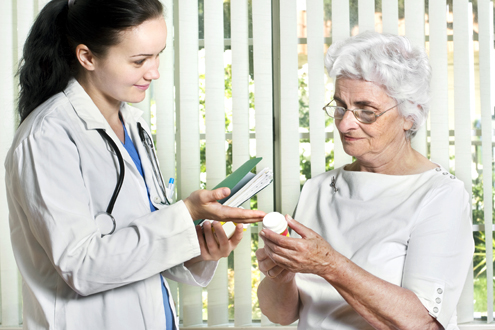URL COPIED!
Medication Safety
Know Your Drugs
Be in the know about what you're taking. Ask your pharmacist:
 The medication's trade name and generic name.
The medication's trade name and generic name.- How the drug works-the general effect it has on the body and how that effect is achieved.
- How you should take it. For example, some prescriptions need to be taken on a full stomach, some can't be taken with coffee or tea, etc.
- When you should take it and what to do if you should accidentally skip a dose.
- How to store it. For example, some medications should not be exposed to light for long periods of time and others must be kept refrigerated.
- Interactions of the new prescription with other prescriptions you are currently taking. You should also ask about interactions with any herbal supplements, over-the-counter medications or vitamins you are taking. Get an overview of all of the possible interactions the drug may have, including interactions with food and drinks like alcohol, tea and coffee. If you are a smoker, ask about the drug's interaction with nicotine.
- For an information sheet about the medication or a reliable resource you can refer to when you arrive home.
- Your pharmacist's phone number if you have any questions.
Medication Safety Tips
- Look over the packaging before you take a dose to make sure you have the right medication. It is easy to mix up prescriptions because their bottles often look the same.
- If you are taking medication in pill form, take a few sips of water before swallowing the pill, and drink a full glass as you swallow it. This will decrease the chances of the pill getting stuck in your throat or esophagus.
- Don't crush pills without asking your pharmacist. Some pills need an intact coating or capsule in order to work properly.
- When crushing a pill, use a piece of wax paper folded in fours. First, fold and unfold the paper. Then place the pill in the center of the paper, fold it, and use a hard object to crush the pill into powder. When it is crushed, unfold the paper and use a fold groove to pour the powdered pill. This will prevent the pill from slipping as you try to crush it.
- For liquid medications, use the same measuring device every time. A good idea is to ask for a device from your pharmacist. Spoons vary in terms of how much they hold. If you use a spoon, use the same one each time.
- Take the prescription for the duration of the time it is prescribed. Don't slack on taking a prescription just because you feel better. This can cause a relapse of the illness, or, as in the case of antibiotics, a worse illness than the one you started out with.
- Store medications in the containers they originally came in. Changing containers or mixing different types of pills can change their effectiveness and have serious safety consequences.
- Throw out each medication after you are finished taking it. Age changes the effectiveness of most prescriptions. Call your physician for a new prescription if symptoms recur. Copy the information from the prescription bottle on a separate piece of paper before you throw it out, and retain the information for your records.
- Keep a list of your prescriptions.
- Don't share your prescriptions with other people, even if they seem to have the same symptoms or have the same illness. Medications and dosages differ widely from person to person, depending on health history and circumstances.
- Be sure to keep all medication out of the reach of children. Do not give your child a dose of your prescription. Dosages and medications are often different for adults and children.
- Keep the number of a poison control center near your prescriptions in case you accidentally take the wrong prescription or too much medication.
Find Out More
- Patients and Visitors
- Guidelines for Visitors and Families
- Safety Tips for Patients and Visitors
- General Discharge Information
- Interpreter Services
- MyChart Health Record Sign Up
- Text Messaging for Patients
- Telehealth
- Insurance, Billing and Financial Assistance
- Request Medical Records
- Ethics and Patient Rights
- Spiritual Care Department
